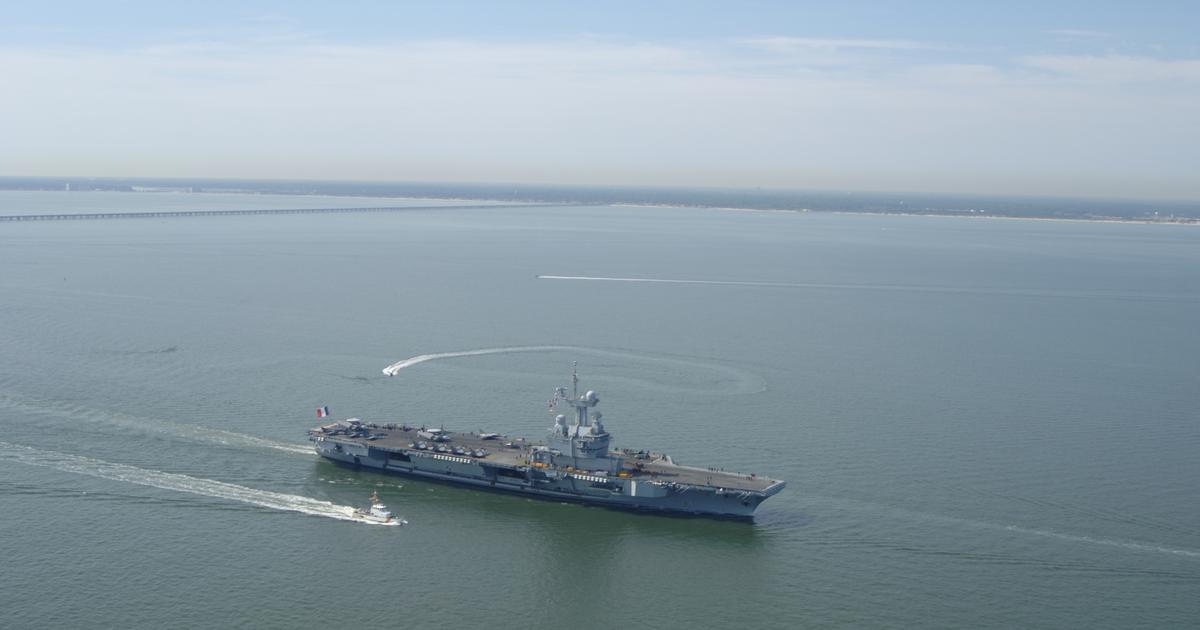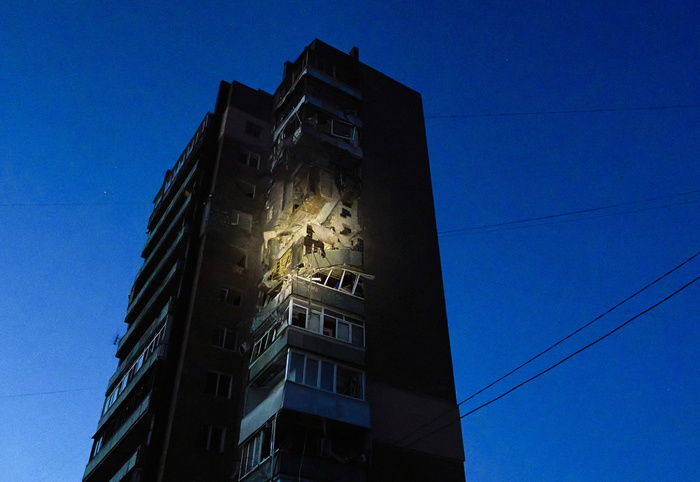(CNN) --
As the world waits to see if Russia will invade Ukraine, a new exclusive CNN poll reveals that twice as many people in Russia believe it would be right for Moscow to use military force to prevent Kyiv from joining the Organization of the North Atlantic Treaty (NATO) versus people who say that would be wrong.
One in two Russians (50%)
interviewed say it would be okay to use military force, while
only a quarter (25%)
say it would be wrong to do so.
The
other quarter of respondents (25%) are not sure
, according to the survey.
But the survey also found that more Russians think it would be wrong to use military force "to bring Russia and Ukraine together," two countries with a long and complicated history of being intertwined.
It's a tough call,
but 43% of Russians
said using military force against Ukraine to unite it with Russia
would be wrong
, while
36% said it would be right.
(The rest of the respondents said they didn't know if it would be right or wrong.)
Perhaps unsurprisingly, most people in Ukraine do not agree with the use of force against them.
Seven out of 10 respondents
said it would be wrong for Russia to use military force to prevent Ukraine from joining NATO (
70%
) or to bring the two countries together (
73%
).
And most Ukrainians reject Russian President Vladimir Putin's claim in a speech Monday that his country has no historical basis and is essentially a creation of the former Soviet Union.
advertising
Why the Soviet Union is connected to the crisis in Russia and Ukraine
Across the country and of all ages, the majority of Ukrainians say that they are not “one people” with the Russians and that the two countries should not be one.
The survey, of more than 1,000 people in each country, was conducted online from February 7 to 15, ahead of Putin's speech on Monday and Moscow's recognition of two breakaway breakaway republics in Ukraine.
Many in Russia believe their country would be fundamentally threatened by further NATO expansion into Ukraine, according to veteran Russian and Soviet-era TV host and journalist Vladimir Pozner.
"It speaks to the view that if Ukraine becomes a NATO member, and if NATO forces were to be deployed on Russia's doorstep, that would constitute an existential threat and therefore cannot be allowed," he said. Pozner to CNN via email.
Orysia Lutsevych, head of the Ukraine Forum at the Chatham House think tank in London, painted a darker picture of the Russian perspective.
"Modern Russia has a syndrome of collapsing empires," he told CNN by email.
“The loss of these lands is presented as a 'historical injustice' that must be rectified, even by force.
Ukraine is seen as a crown jewel being 'robbed by NATO'.
Taking advantage of the old Soviet scaremongering about the US and NATO, the Russians believe that it is an aggressive bloc that is on the way to unity between Russia and Ukraine”.
Fear of the first blow
Contrary to Western warnings that Russian President Vladimir Putin is deploying forces to attack the country's western neighbor, only
13%
of Russians believe
the Kremlin is likely to initiate military action
against Ukraine.
Most Russians also do not expect a Ukrainian attack on their country: only 31% of Russians said that was likely.
In fact, two out of three (
65%
) expect a
peaceful end
to the tensions between Russia and Ukraine.
“The reason 75% of Russians think that Russia will not invade Ukraine is simply because of what they read in their newspapers and see on their television.
Basically no hysteria, no war drums, a consistent message that we don't want a war and we won't start one," Pozner said.
Pozner said the Russians are not naive or ignoring warnings from Western leaders that Putin is considering invading Ukraine.
He explained: “The Russians know what Western leaders are saying.
His statements appear widely in the media.
The general sentiment is that the West, in fact, wants Russia to attack Ukraine because that would be to the advantage of the West, it is prompting Russia to attack.”
But Pozner argued that the Russians understand that an invasion of Ukraine would be costly.
"They are also of the opinion that while Ukraine would not be able to withstand a full Russian invasion, Russia would lose far more than it would gain from any military victory," he said.
However, according to Lutsevych, the prevalence in Russia of the opinion that his country was not going to invade Ukraine may illustrate “how Russian state-controlled media and disinformation are shaping an alternate reality for the Russian population.” .
“Inside Russia, the West presents itself as a villain abusing Ukraine to undermine Russia's greatness.
In the case of a Russian military aggression, Russia will be presented fighting US and NATO forces, and not killing its Slavic brothers,” Lutsevych said.
Meanwhile, fewer Ukrainians than Russians believe there will be a peaceful end to tensions: only 43% expect that.
But Ukrainians are divided on the possibility of Russia starting a war: 42% expect it, while 45% think it unlikely.
(The remaining 13% say they don't know).
More than half of Russians (57%) surveyed and three-quarters of Ukrainians (77%) surveyed think that Ukraine is unlikely to initiate military action against Russia in the near future, with only 31% in Russia and 13% in Ukraine saying they believe Ukraine is likely to provoke a military conflict.
Russians and Ukrainians do not even agree on whether there are Russian military forces in the separatist-controlled eastern areas of Ukraine known as Donbas: three quarters of Ukrainians (73%) believe that there are Russian troops there, unlike one out of five Russians (19%).
Why is Donbas at the center of the Ukraine crisis?
Younger Russians were more likely than the general population (28%) to say that their troops were in Donbas.
The survey was completed before Putin's announcement that Russia would send what he called "peacekeepers" to the regions.
Russia had maintained for years that it had no soldiers on the ground there, but US, NATO and Ukrainian officials say the Russian government supplies the separatists, provides them with advisory and intelligence support, and integrates its own officers into its ranks. .
Russia-Ukraine map: This is how Putin's possible invasion could look like 1:59
Brothers or not?
Behind the immediate crisis, Russians and Ukrainians have markedly different views on the relationship between the two countries and their populations.
Two out of three (64%) Russians say that they and the Ukrainians are one people, a position taught in the Soviet era.
When did Ukraine belong to Russia and when did it break away?
Even before his speech on Monday, Putin had been promoting the view that the two peoples are one, particularly in a biased essay last summer.
Why is Ukraine so important to Putin?
2:22
He claimed that “the idea of the Ukrainian people as a separate nation from the Russians” was formulated by intellectuals as recently as the 19th century, disregarding the complex history of the nations by stating: “Since there was no historical basis, and there could be none, the conclusions were corroborated by all sorts of concoctions."
Putin argued that Soviet-era "localization politics" emphasized regional differences, implying that those differences had little historical basis.
"So modern Ukraine is entirely a product of the Soviet era," he insisted.
Yale University historian Timothy Snyder dismissed Putin's entire argument.
"The problem with Putin's essay is that he is so completely wrong about everything that it's hard to know where to start," he told CNN in an email, citing an example of the term "Ukraine" being used as far back as 1648. .
In any case, he said, it is the idea of a Russian nation-state that is a modern construction, not that of Ukraine.
“Russia was not a national idea in the 19th century.
It was an imperial idea.
Smuggled into the essay is the notion that there was a Russian nation, in the modern sense, against which Ukraine was defined.
But there was no such Russian nation in the 19th century,” he said.
Regardless of the historical debate, Ukrainians tend to think of themselves as separate people, the CNN poll found.
Just over a quarter (28%) of people in Ukraine say Russians and Ukrainians are one people, while two thirds (66%) say they are not: a mirror image of the view from the other side of the border.
Snyder argued that Ukraine's opinion should prevail on this issue.
“The voice of the smallest people matters most.
A bigger country claiming a smaller nation is called imperialism," she told CNN via email.
“The Russians tend to say that the Ukrainians and the Russians are one people because (1) they have generally had little contact with Ukraine and (2) this is what their president says and it is very similar to the Soviet line,” Snyder said. .
No region of Ukraine, and no age group, has a majority in which respondents say Russians and Ukrainians are one people.
Even in eastern Ukraine, which borders Russia and is partly controlled by Moscow-backed separatists, fewer than half (45%) of those surveyed agreed that Russians and Ukrainians are one people, a score much lower than in Russia.
Contemporary borders and generation gap
Although Russians tend to say that Russians and Ukrainians are one people, the majority of Russians (54%) say they should be two countries, although a third (34%) say they should be one country.
The remaining 12% say they do not know.
Ukrainians overwhelmingly feel that Russia and Ukraine should be two separate countries: 85% say so, 9% say they should be one country, and 6% say they don't know.
Russians are more likely than Ukrainians to support changing the borders of the two countries so that regions of Ukraine where people might "feel" more Russian can formally become part of Russia.
Once again, opinions across the border are mirror images of each other: two-thirds (68%) of Russians would support changing the borders and 8% would oppose, while two-thirds (64%) of Ukrainians would oppose it and 13% would support it.
Russians and Ukrainians also differ in their views on the former Soviet Union.
Seven in 10 Russians (71%) say the former Soviet Union was a positive thing, while one in 10 (9%) say it was negative, while Ukrainians were evenly split: 34% said it was positive and 35% said it was negative.
The remainder in both countries were neutral or undecided on the matter.
There is a generational divide on the issue in Ukraine, where 41% of people aged 55 and over, old enough to remember the former Soviet Union, see it as a positive thing.
Only a quarter (23%) of Ukrainians between the ages of 18 and 34 (people born after the collapse of the USSR or very young children when it dissolved in 1991) see it as something positive.
The different opinions about the USSR stem from the different relationships with it, Snyder said.
“The Russian leadership tends to define Russia as the successor state of the former Soviet Union.
More than the Ukrainians, the Russians have difficulty defining a history without the former Soviet Union at the center,” said the Yale historian.
“The Russians tend to accept that the former Soviet Union had policies of terror, but believe that the costs of these were borne equally throughout the USSR.
In the Ukraine, people tend to believe that the Holodomor of 1932-1933, a political famine engineered by Stalin, was aimed at his country in particular.”
Common Concerns
Despite the wide gap in their views, the Russians and the Ukrainians agree on some issues.
Given a list of nine characteristics, Russians and Ukrainians tend to agree on which ones Putin and Ukrainian President Volodymyr Zelensky embodied, with some notable differences.
"Strong" and "decisive" were the second and third most popular responses to Putin among Russians and Ukrainians.
Option number one was radically different: the Russians chose "clever", while the Ukrainians chose "dangerous".
Most Ukrainians chose only "friendly" and "intelligent" as descriptions of their own president, with around 40% also selecting "pragmatic" and "responsible."
Russians, meanwhile, did not rate Zelensky high on any of the characteristics, with a third (35%), similar to the Ukrainians themselves (32%), describing him as "dangerous."
Opinions were sharply divided on US President Joe Biden.
The most common descriptions of Biden by Ukrainians were "intelligent," "strong" and "responsible," while most Russians did not rate him highly on any of the characteristics.
Half (47%) of Russians called Biden "dangerous," as did a third (32%) of Ukrainians.
Majorities in both countries (57% of Russians and 61% of Ukrainians) described themselves as optimistic about the future for themselves and their families, while about a third of Russians and Ukrainians (37% and 32% respectively) were described as pessimistic.
Methodology
Savanta ComRes interviewed 1,021 people over the age of 18 in Russia and 1,075 people over the age of 18 in the Ukraine online between February 7 and 15. Data were weighted to be representative of the Russian and Ukrainian populations by age, sex, and region. The sampling error margin is plus or minus 3.1 percentage points for Russia and plus or minus 3 percentage points for Ukraine for national data.
The sampling error margins for the age groups in Ukraine are as follows: 5.6 percentage points for ages 18 to 34, 4.8 points for ages 35 to 54, and 5.2 points for ages older than 55 years. The sampling error margins for the age groups in Russia are as follows: 5.2 percentage points for ages 18 to 34, 5.4 points for ages 35 to 54, and 5.3 points for ages over 55 years.
The geographical regions of Ukraine on the map are made up of the following administrative regions:
North: Chernihivska Oblast, Kyivska Oblast, Sumska Oblast, Zhytomyrska Oblast, Kyiv;
West: Chernivetska Oblast, Ivano-Frankivska Oblast, Khmelnytska Oblast, Lvivska Oblast, Rivnenska Oblast, Ternopilska Oblast, Volynska Oblast, Zakarpatska Oblast;
Center: Cherkaska Oblast, Dnipropetrovska Oblast, Kirovohradska Oblast, Poltavska Oblast, Vinnytska Oblast;
East: Donetska Oblast, Kharkivska Oblast, Lugansk Oblast;
South: Khersonska Oblast, Mykolaivska Oblast, Odeska Oblast, Zaporizka Oblast, Crimea, Sevastopol.
The sampling error margins for these geographic regions are between 5.8 and 7.6 percentage points.













